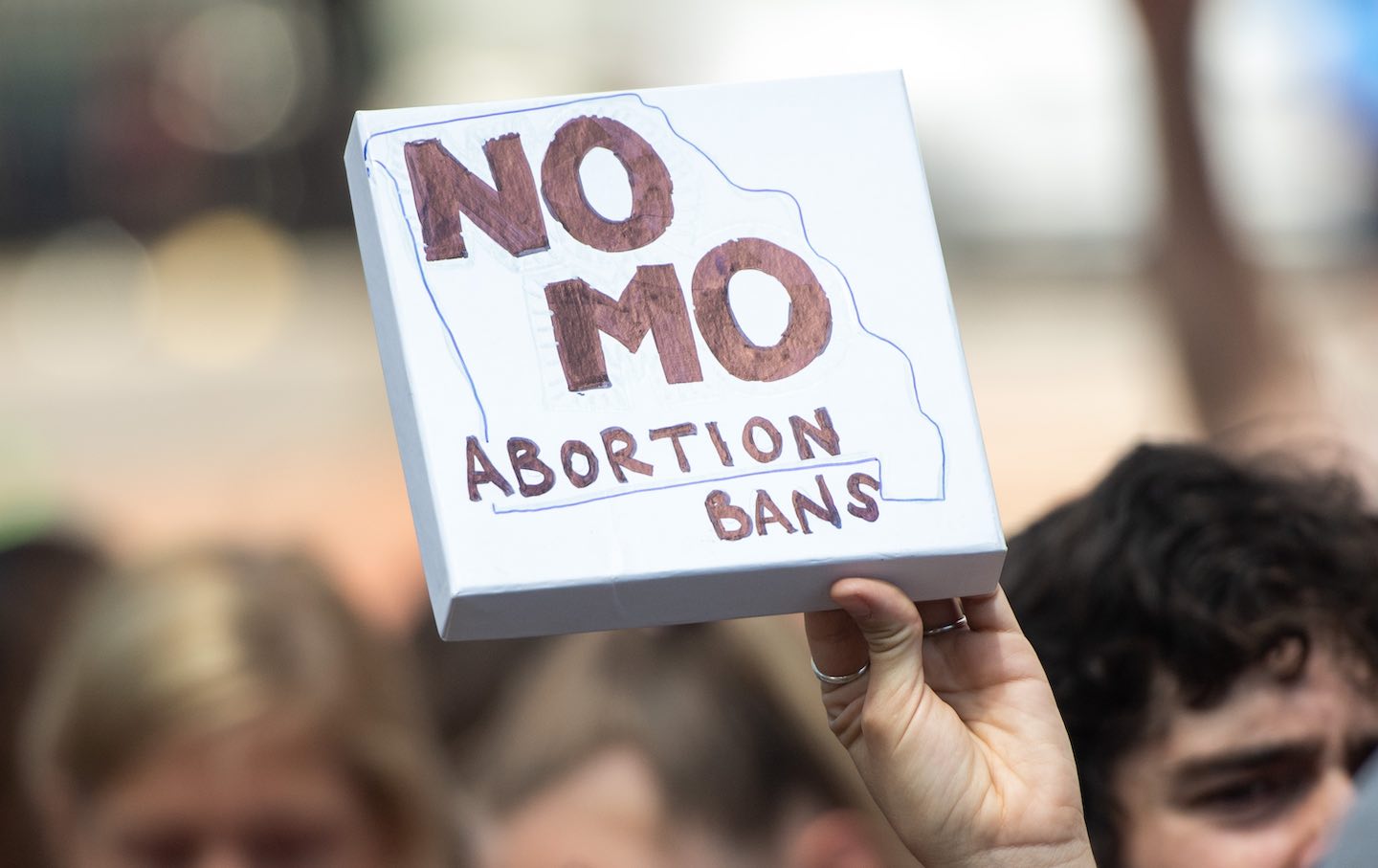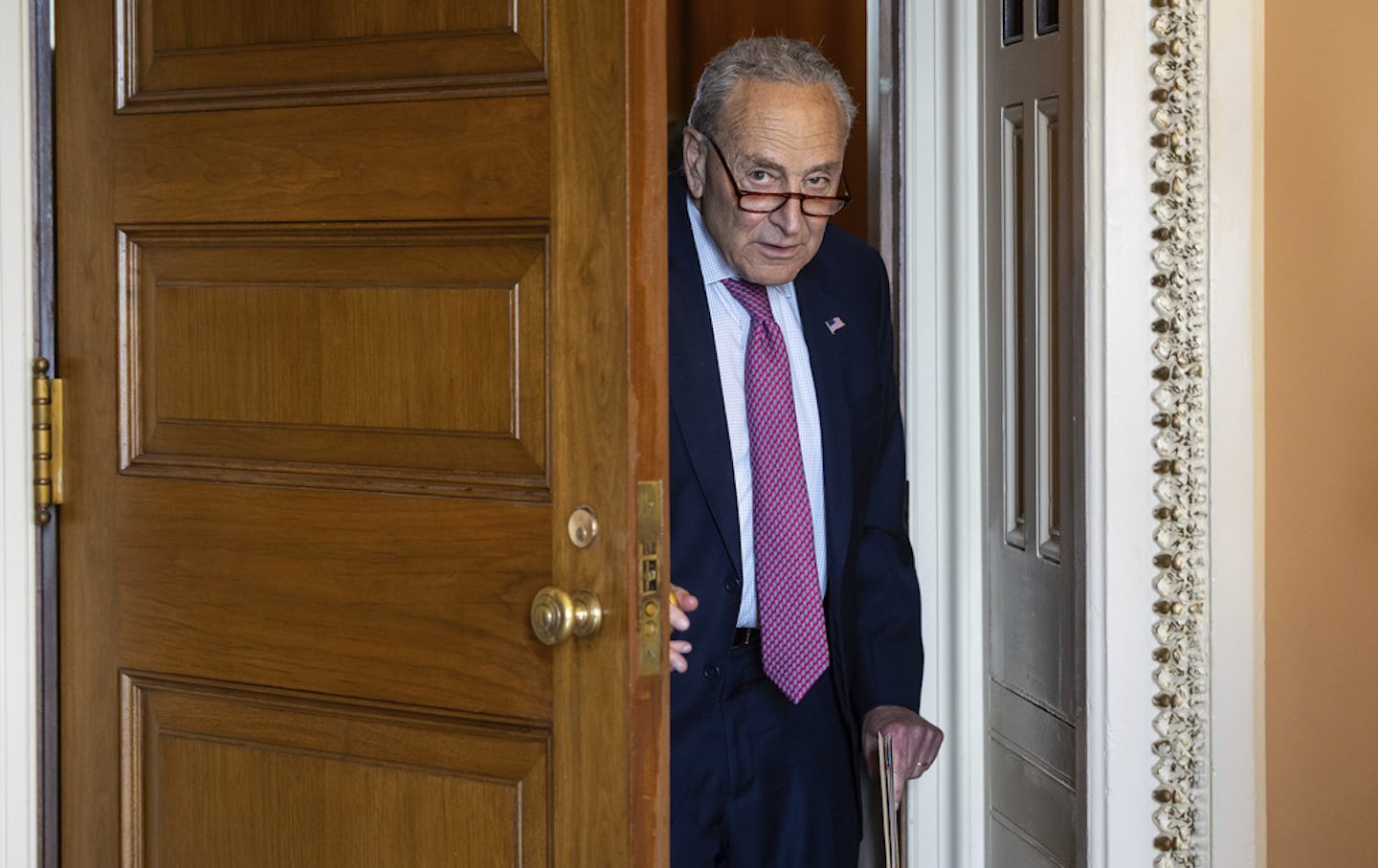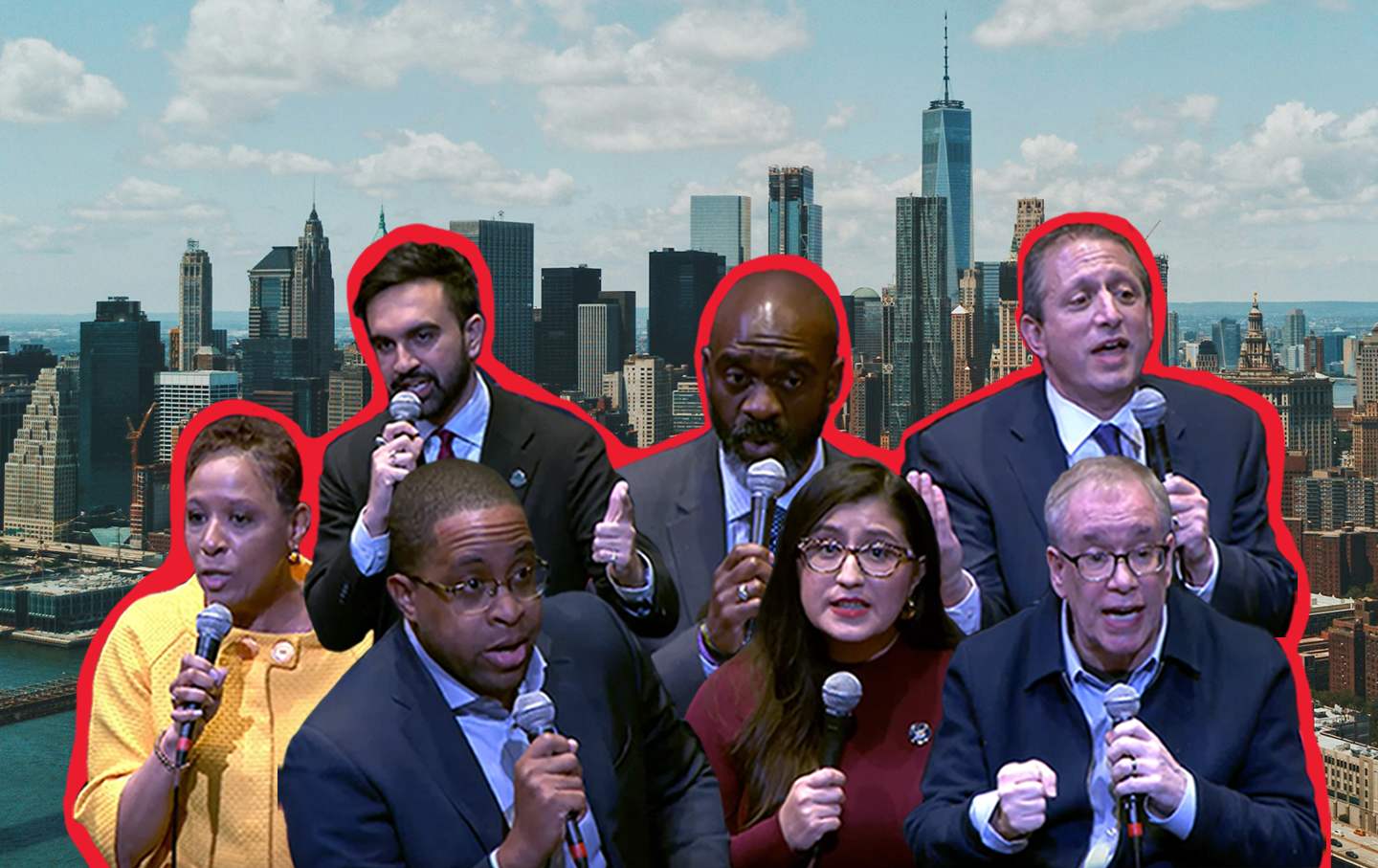Could an Abortion Rights Referendum in Missouri Give Democratic Candidates a Chance?
The party has strong candidates up and down the ballot, and a referendum could bring out enough young voters to turn this red state purple.

An abortion-rights protester holding a “No MO Abortion Bans” sign at a pro-choice rally in St. Louis, Missouri, on May 30, 2019.
(Photo by Saul Loeb / AFP via Getty Images)Missouri used to be a swing state, where Democratic presidential candidates made last-minute campaign stops and sometimes won, and where Democrats frequently held the governorship and US Senate seats. Of the 25 presidential elections in the 20th century, Democrats won 14—even electing one of their own, Harry Truman, as vice president in 1944, and president in 1948. Bill Clinton carried the state twice and, as recently as 2008, Barack Obama came within 4,000 votes of winning it. The state sent a Democrat, Claire McCaskill, to the US Senate through 2018; and it had a Democratic governor, Jay Nixon, who made national headlines for blocking Republican attempts to restrict access to abortion. Now, however, Missouri has an anti-choice Republican governor, two extreme right-wing US senators, and a habit of voting for Donald Trump.
But could Democrats stage a comeback in Missouri in 2024, perhaps making Joe Biden’s reelection bid in the state competitive? Could the party’s likely US Senate nominee, progressive populist Lucas Kunce, have a fighting chance to flip the seat now held by Republican Josh Hawley? Is it a reasonable prospect that the party’s likely gubernatorial nominee, state House minority leader Crystal Quade, might renew Democratic control of the statehouse?
If access to abortion remains the winning issue that it has been since the US Supreme Court overturned national protections with its 2022 Dobbs decision, it is certainly within the realm of possibility that Missouri might renew its battleground-state status. That is because Missourians are now expected to vote in November on a high-stakes abortion rights referendum that could shake up the state’s politics.
The lesson from recent elections around the country is that a referendum of this sort has the potential to significantly increase turnout by pro-choice voters. A significant portion of those voters could, in turn, boost Democratic races for national and state posts.
Missourians for Constitutional Freedom, a coalition of reproductive health care advocates that has been campaigning to place an abortion amendment on the fall ballot, needed to file 171,592 valid signatures by the end of last week to secure a ballot spot. On Friday, the deadline for filing signatures, a long line of activists began delivering to the Missouri secretary of state’s office boxes containing more than 380,000 signatures. That’s double the requirement for qualifying for a November referendum vote on overturning Missouri’s abortion ban and codifying reproductive rights in Missouri’s state constitution.
“Our message is simple and clear,” says Tori Schafer, an American Civil Liberties Union lawyer and spokesperson for the campaign. “We want to make decisions about our bodies free from political interference.”
There is no question that support for abortion rights crosses political lines. Republicans in a number of red states have joined Democrats in backing ballot measures protecting reproductive rights, and that will surely be the case if there’s a November referendum vote in Missouri.
But Democrats believe that the Missouri referendum, like similar ballot initiatives in Florida and Arizona, could also attract young people and other likely pro-choice voters to the polls. The Democratic hope is that these voters would not only back the referendum but also boost the fortunes of Biden, Kunce, and Quade.
Quade, in particular, has been an outspoken advocate for a referendum. That’s primarily because she is a committed supporter of abortion rights who wants to defend personal freedoms. But as a savvy political figure who leads her party’s caucus in the state House, Quade is well aware of the impact that popular support for abortion rights has had in recent election cycles.
When abortion rights issues are on the ballot, even in states that lean Republican, voters show up to defend reproductive rights. And that often benefits Democrats. Since the Supreme Court’s 2022 decision in the Dobbs case, voters in California, Kansas, Kentucky, Michigan, Montana, Ohio, and Vermont have backed abortion rights. Two of those states, Kansas and Kentucky, are states that backed Trump in 2016 and 2020 and yet have elected and reelected Democratic governors who support abortion rights. And it’s worth noting that Michigan’s November 2022 referendum on abortion rights gave a big boost to Democrats, who won full control of the state legislature for the first time in decades. After the 2023 off-year elections produced big wins for pro-choice Democrats in Kentucky, Virginia, and New Jersey, the New York Times headline read, “Abortion Rights Fuel Big Democratic Wins, and Hopes for 2024.”
This spring, when the Florida Supreme Court cleared the way for a November referendum on abortion rights in that state, CNN reported that the decision “delivered a burst of Democratic optimism that this once-purple battleground could flip blue again.” Biden campaign manager Julie Chavez Rodriguez declared that Florida was suddenly “winnable.”
Florida is an easier state for Democrats than Missouri. Biden got 48 percent of the vote in the Sunshine State in 2020, while he got just 41 percent in the Show Me State. In addition, Missouri voters have shown a tendency to take progressive stands when voting on referendums—as they did in 2018, when they overturned the state’s anti-labor “right-to-work” law by a 67-33 margin—and still elect Republicans to statewide posts. But this year, Biden’s running against a 91-times indicted Trump, while Kunce is targeting Hawley as a senator who encouraged efforts to overturn the 2020 election results and then fled the Capitol when Trump backers he had greeted with a clenched fist of solidarity stormed the building on January 6, 2021. Hawley’s also one of the Senate’s most ardent foes of abortion rights, while Kunce is an equally ardent supporter of reproductive rights who says he wants to prevent “control-freak politicians” from imposing their will upon women.
“This fight is about our rights and power—the right to an abortion and the power to control our own lives,” Kunce says of his challenge to Hawley. “I’ll fight to end the filibuster and enshrine reproductive rights and abortion rights into law.”
With the prospect that the referendum fight will raise the stakes in November, there will be added attention to the abortion rights stances of Kunce and Quade. That won’t assure victory. But it could make races up and down the Missouri ballot considerably more competitive.
If national Democrats decide to go all in for Missouri, as it appears they will do for Florida, the political dynamic could shift. And this reddish state might once more be the sort of battleground state where Democrats have a path to victory.
Popular
“swipe left below to view more authors”Swipe →Support independent journalism that exposes oligarchs and profiteers
Donald Trump’s cruel and chaotic second term is just getting started. In his first month back in office, Trump and his lackey Elon Musk (or is it the other way around?) have proven that nothing is safe from sacrifice at the altar of unchecked power and riches.
Only robust independent journalism can cut through the noise and offer clear-eyed reporting and analysis based on principle and conscience. That’s what The Nation has done for 160 years and that’s what we’re doing now.
Our independent journalism doesn’t allow injustice to go unnoticed or unchallenged—nor will we abandon hope for a better world. Our writers, editors, and fact-checkers are working relentlessly to keep you informed and empowered when so much of the media fails to do so out of credulity, fear, or fealty.
The Nation has seen unprecedented times before. We draw strength and guidance from our history of principled progressive journalism in times of crisis, and we are committed to continuing this legacy today.
We’re aiming to raise $25,000 during our Spring Fundraising Campaign to ensure that we have the resources to expose the oligarchs and profiteers attempting to loot our republic. Stand for bold independent journalism and donate to support The Nation today.
Onward,
Katrina vanden Heuvel
Editorial Director and Publisher, The Nation
More from The Nation

The Opposition Party That Wasn’t The Opposition Party That Wasn’t
With Democrats failing to put up much of a fight against the Trump administration, favorability ratings have plummeted to an all-time low.

Group Chat War Plans Provide a Window Into Trump’s Mafia State Group Chat War Plans Provide a Window Into Trump’s Mafia State
American foreign policy is now all about incompetent shakedowns and cover-ups.

One of These Progressives Could Be New York’s Next Mayor One of These Progressives Could Be New York’s Next Mayor
On Saturday, seven mayoral candidates made their case to the Working Families Party and The Nation magazine in advance of the June primary.

The Democrats Have Disappeared The Democrats Have Disappeared
As Trump and Musk bulldoze democracy, the Democratic Party is MIA. While Republicans use government to cripple the opposition’s ability to compete, Democrats whine about “no...

Democrats: Tell Mike Huckabee to Go to Hell Democrats: Tell Mike Huckabee to Go to Hell
Trump’s nominee for Israel ambassador believes that we need bloodshed in the Middle East to bring about the end times. Nobody could be a worse choice.



